Giovanni Rotondo's Blog Gives Film Scorers Both Advice and Community

Giovanni Rotondo B.M. ’06
Image courtesy of Giovanni Rotondo
A few years after moving to London, stay-at-home dad Giovanni Rotondo B.M. ’06 was looking for a way to reignite his career as a film composer when he came across a book that suggested a path forward.
That text, The Lean Startup, by Eric Ries, argues that in order to get a project off the ground, it’s more important to send imperfect work out into the world than it is to spend time smoothing all its rough edges.
“I thought, ‘That’s great, that’s exactly what a film composer, especially young people, should do,’” Rotondo said. “Don’t waste time making [a cue] perfect to your ears before the director even approves it.”
The idea inspired Rotondo to take the first step in a project he’d been mulling that he believed would help his career, no cues involved: “I thought it would be so cool to write an article about that.”
“We live in a professional world where everything is changing so fast, and even the most experienced composers need to be aware of the latest technologies, of the latest trends and genres, and the way music is evolving.”
—Giovanni Rotondo B.M. '06
The piece, "The Lean Composer—Part 1," launched his blog, Film Scoring Tips, in September 2018. The idea behind the blog was twofold. First, it would be a resource for composers at any stage of their career, covering everything from new software to how to manage mental health. As varied as the topics are, each article must stay true to the blog’s title; it needs to contain tips or advice that both novice and accomplished composers would find valuable.
“We live in a professional world where everything is changing so fast, and even the most experienced composers need to be aware of the latest technologies, of the latest trends and genres, and the way music is evolving,” he said.
A Well-Defended Lobby
The second reason Rotondo created the blog was to help him break into the tightly knit world of London’s film composers. He had moved to the city from his native Italy in 2015 after his wife got a job there.
It was an opportune time for Rotondo to move. He said he hit a bit of a glass ceiling in Italy, working in just one genre of television scoring. Before this, he had developed a course for Centro Sperimentale di Cinematografia in Rome, the national film school. “I was fresh out of school, of the (Optional Practical Training) year in Los Angeles, and it was fairly easy for me to take all my school experiences and put together a class for young Italian composers who couldn’t afford a top-tier international school,” Rotondo said. As part of the program, he invited well-known Italian composers, such as Ennio Morricone, as visiting artists.
After a few years in London, taking care of his daughter, Rotondo wanted a vehicle with which to access what he called the lobby of the city’s film composers. “It’s very much defended and you have to build your own network,” he said. The blog, he figured, would be a good way to get his name out there.
The plan worked. “I started getting good, new contacts, and started working on new projects,” he said, adding that the blog “helps me when I reach out to a director that I haven’t met before. When I introduce myself as a composer and editor-in-chief of Film Scoring Tips, sometimes they’ve heard of it.”
Though the blog has helped Rotondo establish credibility in London film scoring circles, it also gives him a sense of satisfaction when he hears stories of how it helps other composers. In September 2019, he held a one-year anniversary party for the blog and nearly sold out the 50 available tickets. At the event, many composers came up to him to share stories of successes they’ve had thanks to tips they got on his site. “I started seeing the impact that it is having on young composers, a positive impact. And that is really great,” he said. To date, Film Scoring Tips has more than 50,000 views. Many of those readers regularly send Rotondo emails asking for advice, and keeping him updated on their accomplishments. “It’s helping me and other composers to create a sense of community,” he said.
Virtuous Circles
Rotondo has since gotten involved in other community-building projects, such as developing Micro Short Films, an online film festival of shorts between 30 to 90 seconds long. He created the festival after noticing that it’s extremely difficult to make meaningful connections at professional networking events. Instead of giving someone a business card, he thought, why not create projects where you can actually test how it is to work with people you didn’t know before? The networking event was in the spring. “People were ecstatic about the experience,” Rotondo said. The reception was so enthusiastic that he’s done more iterations of the festival and is looking to turn it into a company.
He’s also started a podcast, Filmmaker’s Feedback, in which he interviews filmmakers, asking them about what they look for in a composer and how they judge composers’ work.
On top of the blog, film festival, and podcast, Rotondo is taking advice from his blog and using it to write music. One piece he created for a production library was just used in the hit Netflix show Dark Desire.
After discovering this, Rotondo did something unusual for a composer: He reached out to people behind the show and asked them if they’d sit down for an interview.




